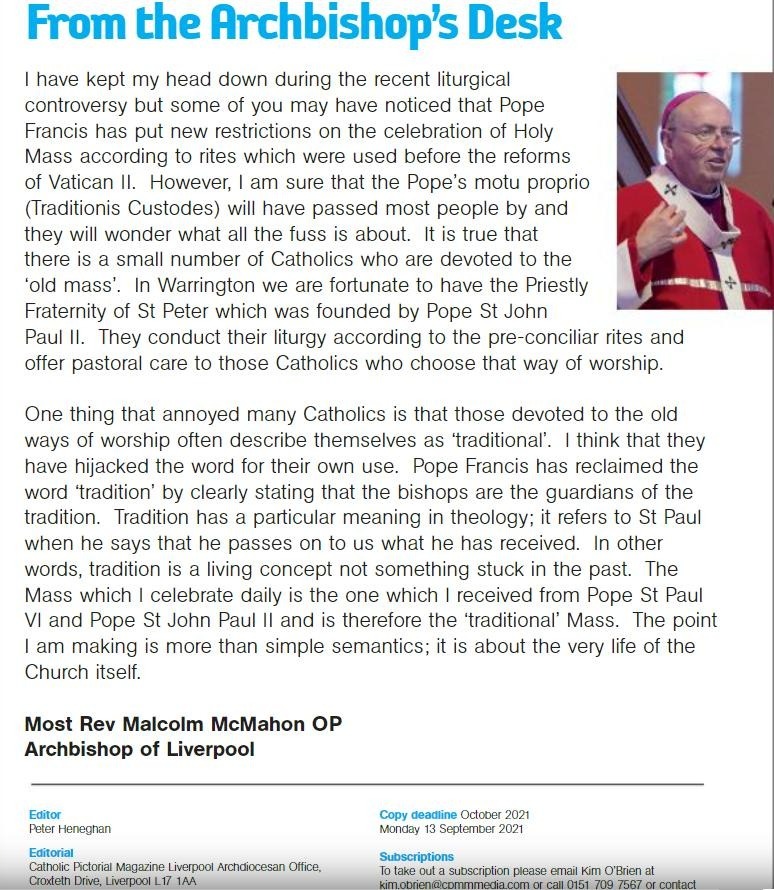Fr Zed looks at the Collect for today's Feast and a rather ridiculous statement from His Grace the Archbishop of Liverpool on Traditionis Custodes.
From Fr Z's Blog
Let’s look at the Collects for the Feast of the Exaltation of the Cross in both the Ordinary and the Extraordinary Form, Novus Ordo (1970MR etc.) and the Vetus Ordo (1962MR of St John XXIII). These are now, apparently acknowledge as being two different Rites rather than two different uses or forms of the same rite. This is something we all knew, of course. BUT… with Summorum Pontificum we had a juridical solution that easily allowed for priests to use either book.
That reminds me, however, of something entirely inane that I saw from the Archbp. of Liverpool the other day.

He says that this is “more than simple semantics”.
Well, no. In this case, it is precisely that.
To suggest that somehow the Novus Ordo is “the ‘traditional Mass” (note the singular), that its traditional pedigree, content, lasting impact on the Church is on par with that of the Vetus Ordo is, on the face of it, absurd.
And within that crazy assertion there is an admission: by naming only Paul VI and John Paul II we see that he admits a break in the continuity of what has been handed down. The Novus Ordo, a different Rite, artificially constructed according to principles that were outside of those few things mandated by the Council Fathers in Sacrosanctum Concilium, was implemented in 1969/70. It constitutes a break with longer tradition, understood as having begun before 1969.
If you are going to claim that that the 1970/2002 Missale was handed down to that Archbishop by Paul VI and John Paul II, and that is therefore “tradition” (simply because they legislated its use – and legislation is juridical not theological) then you have to admit the same thing about the 1962 Missale. Paul VI permitted the 1962 Missale. He handed it down. John Paul permitted its use. He handed it down. Benedict XVI permitted its use. He handed it down. Heck, even within the dreadfully cruel Traditionis Francis permits its use. He handed it down, nolens volens.
Paul VI and John Paul II gave that Archbishop the 1970 Missale, but the 1962 Missale was handed down to all of us by
Benedict XVI
John Paul II
John Paul I
Paul VI
John XXIII
Pius XII
Pius XI
Benedict XV
Pius X
Leo XIII
Pius IX
Gregory XVI
Pius VIII
Leo XII
Pius VII
Pius VI
Clement XIV
Clement XIII
Benedict XIV
Clement XII
Benedict XIII
Innocent XIII
Clement XI
Innocent XII
Alexander VIII
Innocent XI
Clement X
Clement IX
Alexander VII
Innocent X
Urban VIII
Gregory XV
Paul V
Leo XI
Clement VIII
Innocent IX
Gregory XIV
Urban VII
Sixtus V
Gregory XIII
Pius V
And we could go back to Gregory I (+604).
Enough of that. Let’s move on to today’s lovely feast.
Today’s feast commemorates the discovery in AD 325 in Jerusalem by the Emperor Constantine’s mother St Helena of the Holy Cross, as tradition has it, under sweet basil herb bushes. It is also the anniversary of the Dedication of the Basilica of the Holy Sepulcher built on that site in 335. A portion of the Cross was placed there. The Basilica was consecrated on 13 September and, on 14 September the fragment of the Cross was shown to the people so that the clergy and faithful could pray before it. In 614 invading Persians and King Chosroes absconded with it. They held it until it was recaptured by the Byzantine Emperor Heraclius in 628 and returned to the Basilica.
St. Helena brought a portion of the Cross and other instruments of the Passion back to Rome. They were deposited, along with soil from the holy ground, at what is now called the Basilica Sessoriana, Santa Croce in Gerusalemme.
COLLECT (1962):
Deus, qui nos hodierna die Exaltationis sanctae Crucis annua solemnitate laetificas: praesta quaesumus; ut cuius mysterium in terra cognovimus, eius redemptionis praemia in caelo mereamur.
LITERAL VERSION:
O God, who on this day gladden us by the yearly solemnity of the Exaltation of the Holy Cross: grant, we beseech You; that in heaven we may merit to attain the rewards of redemption of Him, whose mystery we have known on earth.
The colons and semicolons in the older way of printed liturgical orations are intended to help the priest sing the prayer, rather than to give it greater sense.
The force of the last phrase is “whom we have known on earth in mystery”. Remember that mysterium is nearly interchangeable with sacramentum. Notice the parallel set up between in terra… in caelo. In this life, we can know Christ and what is promised us in heaven only as through a glass, darkly, as St Paul put it. Our supreme contact with Christ in this life is in the sacramental mysteries, in our sacred liturgical worship and in Holy Communion. In heaven our knowledge will be more direct, though God will forever remain Mystery, tremendum et fascinans, awesome and alluring.
Here is another version from the beautiful hand missal from Baronius Press:
O God, who this day dost gladden us by the yearly feast of the Exaltation of the Cross: grant, we beseech Thee, that we who on earth acknowledge the Mystery of Redemption wrought upon it, may be worthy to enjoy the rewards of that same Redemption in heaven.
The Baronius Press hand missal, printed in the UK, was released in 2007, the same year that Benedict XVI issued Summorum Pontificum – the “Emancipation Proclamation” which greatly freed up the use of the 1962 Missale Romanum. Summorum, with its juridical solutions, is one of the most important accomplishments of Benedict’s too short pontificate. Now, however, the emancipation of faithful Catholics with Summorum has been cruelly undermined with Traditionis custodes, Francis’ Plessy v. Ferguson to Benedict’s Proclamation.
Let is now move to the Novus Ordo edition of the Missale Romanum.
COLLECT (2002):
Deus, qui Unigenitum tuum crucem subire voluisti, ut salvum faceret genus humanum, praesta, quaesumus, ut, cuius mysterium in terra cognovimus, eius redemptionis praemia in caelo consequi mereamur.
This was pieced together from phrases from Collects of Palm Sunday and of Wednesday in Holy Week as well as today’s feast in the pre-Conciliar Missal, as we just saw above.
LITERAL ATTEMPT:
O God, who desired that Your Only-begotten undergo the Cross so that He would make the human race free, grant, we beseech You, that we merit to attain in heaven the rewards of redemption of Him, whose mystery we have known on earth.
OBSOLETE ICEL (1973):
God our Father, in obedience to you your only Son accepted death on the cross for the salvation of mankind. We acknowledge the mystery of the cross on earth. May we receive the gift of redemption in heaven.
Not content to chop the Latin into two sentences, the translators opted for three.
CURRENT ICEL (2011):
O God, who willed that your Only Begotten Son should under the Cross to save the human race, grant, we pray, that we, who have known his mystery on earth, may merit the grace of his redemption in heaven.
 Today, the aromatic herb basil (Ocimum basilicum which, comes from Greek basileos, “king”) is blessed by our Eastern brothers and sisters and placed in abundance around their Crosses.
Today, the aromatic herb basil (Ocimum basilicum which, comes from Greek basileos, “king”) is blessed by our Eastern brothers and sisters and placed in abundance around their Crosses.
I suggest having pasta and basil pesto tonight with a crisp, cold white Sauvignon Blanc or a Sancerre. With friends and loved ones, it would be a fine way to observe the feast day.
NB: By “basil” pesto, I don’t mean made from Basil Emeritus, though he could be invited.
Since there are now two “Popes” in the Vatican, why not have two hamsters, Basil and… meet… Ming.
No comments:
Post a Comment
Comments are subject to deletion if they are not germane. I have no problem with a bit of colourful language, but blasphemy or depraved profanity will not be allowed. Attacks on the Catholic Faith will not be tolerated. Comments will be deleted that are republican (Yanks! Note the lower case 'r'!), attacks on the legitimacy of Pope Leo XIV as the Vicar of Christ, the legitimacy of the House of Windsor or of the claims of the Elder Line of the House of France, or attacks on the legitimacy of any of the currently ruling Houses of Europe.